
As we celebrate the 10th anniversary of the Emerging Scholars Network blog, we’ve been sharing reflections from members of our community. Today, ESN author Scott Santibanez shares his reflections in the form of a letter to fellow ESN members. You can also browse Mike Hickerson’s reflection on 10 years of the ESN blog here, and Andy Walsh’s thoughts on 6 years of science blogging for ESN here. To read more of Scott’s writing, click here.
Dear friends,
Ten years ago, a group of dedicated people launched the Emerging Scholars Blog. They envisioned an online environment where others could communicate about faith, scholarship, and academic and professional careers. Now a decade later, the Emerging Scholars Blog continues to grow, adapt and thrive.

To be honest, as a Gen-Xer who did not grow up with this technology, I still find the concept of an online “third place” to be somewhat challenging. I graduated from medical school in 1994, and first used a cell phone two years later. In 1998, I bought a laptop so I could dial up using my landline phone to access new technologies—the Internet and email. In 2003, still fairly early in my professional career, a handful of my colleagues and I were issued Blackberries. These amazing devices allowed us to send emails without logging on to a phone line. In those days, Blackberries were rare and far too expensive for everyone to have one. In 2007—nearly 14 years into my post-doctoral career—my wife bought me an iPod touch for Christmas. At the time, I was not yet convinced that the whole smart phone craze would catch on. It might just be a passing fad. And anyway, I already had a flip phone. Why did I need another phone? You get the idea. From this perspective, I’d like to share a few thoughts:
To my faculty and professional friends and colleagues: In this digital age, it is essential that we remain open to taking chances and exploring new ways to communicate, as Tom, Hannah, Micheal, and others have done with the Emerging Scholars Blog. Whether you are an older millennial, a Gen-Xer like me, or a baby boomer, we should do our best to be open to change, even when change can sometimes make us uncomfortable.
To students—younger millennials and the post-millennial generation: Please be aware that some of your professors and potential mentors are, like me, dinosaurs who may not have grown up with this technology. We have wisdom and life experience—often from making our own mistakes and learning from them—that can be valuable to you. We know stuff about life, death, and relationships. We’ve dealt with professional successes and disappointments. We know what it’s like to have a manuscript or grant rejected, or not get a promotion. We may even be able to help you think through honest questions about God, spirituality and finding meaning in life. But . . . in this age of information technology, we may not always know how to communicate what we know, and to connect in ways that resonate and capture your attention. We need you to work with us. Teach us what communication channels work best for you, ask good questions, and find ways to draw out our life experience.
In this digital era, people are conditioned to quickly flip through YouTube videos and Amazon products. It’s a great way to find funny cat videos, but it’s not always the best strategy for building relationships. Community requires authentic interactions between real people. Because the technology advances so quickly, we are all still trying to figure out how to do this well online. The Emerging Scholars Blog has been a wonderful experiment in creating an online “third place.” My hope and prayer is that the Blog will continue to grow, adapt and thrive . . . and that the online friendships, Facebook chats, and sharing of blog posts will someday weave seamlessly with in person meetings, and lead to meaningful, substantive, mutually-beneficial relationships that last over time. Here’s to a great decade and another 10 years to come!
—Scott
Tito Scott Santibañez is an adjunct professor at Emory University and Trinity School for Ministry. As a volunteer physician, he has provided medical care for underserved populations for nearly 25 years. He also has a doctorate from seminary.

Leave a Reply